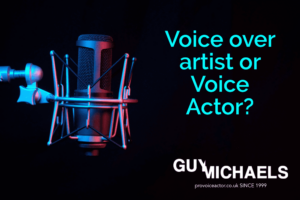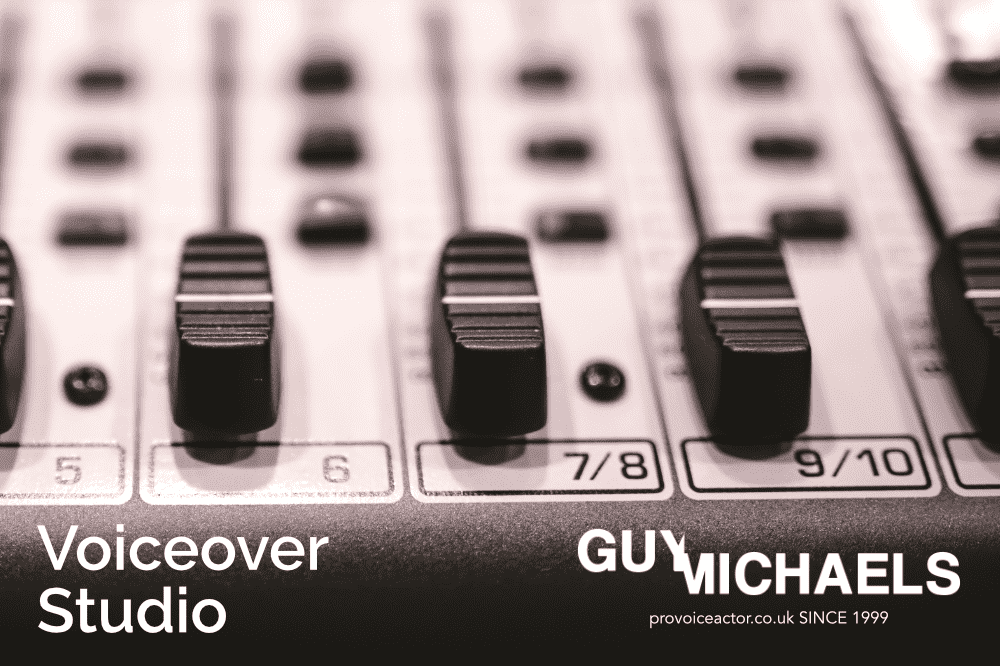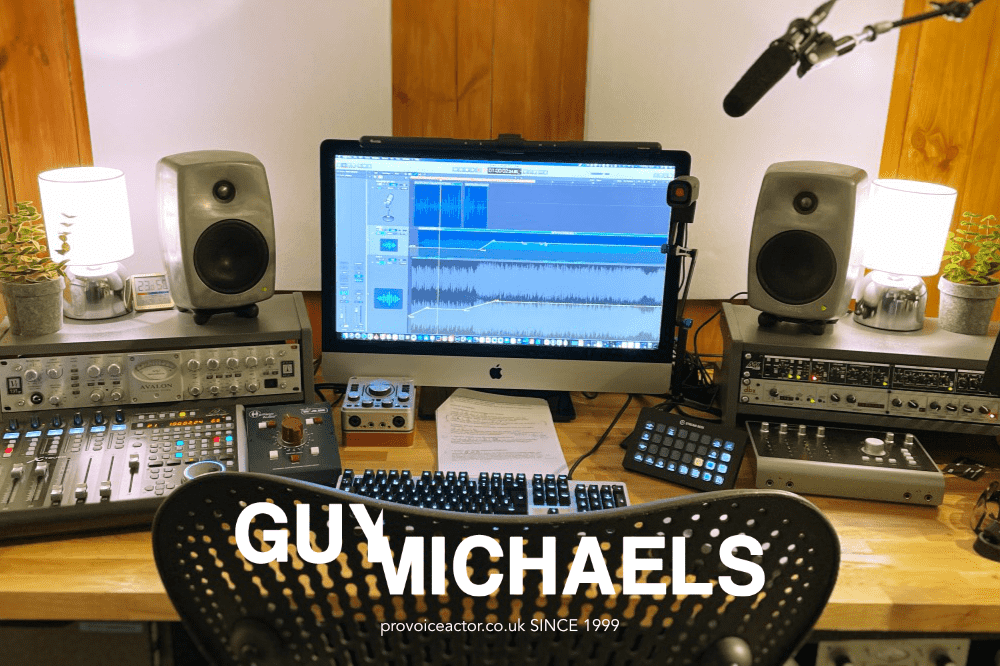
What is the difference between a voiceover artist and a voice actor?
Firstly, is there a difference between a voiceover artist and a voice actor?
Yes. And no.
It depends on whom you are asking.

I’ll start quickly with why you could argue today that there is no difference. The terms used to describe that of the individual at the microphone, the performer who is speaking the words being recorded (or sometimes performed live for events etc) include:
voice actor
voice over
voiceover artist
VO (short for voiceover)
VA (short for voice actor)
and more.
Searching for a voiceover artist of voice actor
When you search online for a voiceover artist or voice-actor, the results will likely be similar because, as I said the terms are interchangeable and the performers often describe themselves as either or both. The voiceover industry has many interchangeable, and often confusing terms!
You could also argue, before we get into the differences between the varying types of work carried about by those folk above, that ALL jobs demand a degree of acting. That’s a degree OF acting and not a degree IN acting! Even something as simple as a telephone menu for a doctors’ surgery requires the approach of an actor to some extent.
No, the performer need not overthink it and create pathos where there isn’t any, or invent a narrative arc when it’s not needed, but acting skill must be employed in order to assist in the delivery of the message to the listener.
The role of a voiceover artist and that of a voice-actor do differ somewhat but to understand how, we must look at what exactly defines Voice Over and Voice Acting.

Definition of Voice Acting and Voice Over
Voice acting by its very nature (and the use of the word acting) calls upon an individual to approach the job of the recorded spoken word as an ‘actor’. The type of work, the script itself and the target audience could dictate that the job is that of ‘voice acting’ rather than ‘voice over’.
Examples of voice acting jobs rather than voice over jobs:
- Character voices in a video game.
- A fiction audiobook narration in which the narrator not only tells the story but also plays and speaks the words of the characters
- An audio-play or audio-drama production
- Animation
Not all voiceover artists class themselves as actors, partly because of the fact that they might not record the kinds of jobs shown above. I trained at a London drama school in the mid-nineties (Mountview Academy of Theatre Arts) so yes I’m an actor but not one who performs in theatre these days.
I approach all jobs with a sense of ‘acting’ – I am playing a role, sometimes a clearly defined character and at other times, simply the narrator whose job it is to help the story move forward, assisting the listener in their understanding of a topic or in the case of a commercial project, urging or guiding them to take an action.
Voiceover work is very varied and individual voiceover artists often specialise in particular areas

Voice over work, although perhaps appearing to be niche or a niche-industry to the uninitiated, is actually wide and varying and the industry itself is huge. A professional voiceover artist provides narration (or voiceovers) for TV advertisements and radio commercials, documentaries, corporate work and other non-character based media.
Typically voice over artists have not trained in the art of traditional acting, often leaving the character work (in animation, gaming and other markets) to those who class themselves as voice actors. However this is not a rule and neither is the choice of term used to describe a voice over artist. I, like many of my colleagues, use the terms of voice-actor or voice over artist interchangeably.
A professional voiceover artist needs to be multi-skilled
Voice over work obviously demands strong vocal skills and the ability to effectively communicate a message to an audience.
Other types of work recorded by voice talent (another often used term!) include e-learning, audiobooks, and telephone systems. As mentioned, the industry is huge and continually growing and the opportunity for voice over work has grown significantly in recent years, due to the rise and accessibility of digital media.
‘Voice talent’ or ‘voiceover talent’ are popular terms in the US.

Voiceover work is not easy. Really!
Voice over work is NOT easy. It can be very demanding and professional voice actors need to be able to work well under pressure, take and respond to direction, work to deadlines and work as part of a wider team of creative professionals.
It is a creatively rewarding profession and with specific voiceover training and experience, voice actors can carve their own unique path in this exciting industry. It is advisable to work with a voice coach to make the most of your natural talent.

Also, it has become increasingly necessary for the voice overs to record and engineer their own work rather than heading into a professional studio. I run a professional studio and cater for all voiceover production needs. It’s not a home studio for voiceover work, but instead a dedicated and custom-built recording studio in which I not only record voice overs but also edit and engineer, clean-up and mix projects for clients all over the world. You can find out more here.
If you have an audio project that you need help with, drop me a line.
Examples of voice over jobs
- Elearning
- Instructional videos
- Explainer videos
- IVR – telephone menus
- Commercials – although sometimes these may require more in terms of voice acting if you are playing a distinct character
- Corporate narrator
- Documentary narrator
So, in a nutshell, voice over is less ‘character-based’ than voice acting, but voice over artists have usually undergone some form of voice over training. Or at least you’d hope they have!
Training for voice actors and voice over artists
Often voice actors come from a traditional acting background having trained in theatre, film and TV. Although not essential, I must state that the total of four years I completed in acting and voice training means that I am very confident to approach a massive range of work. I also know how to use my voice in an optimal and economical way and how to look after it for the long-term.
A voice actor must care for their voice
I’ve been in the voice acting industry for many years now. I have worked with non-trained voice over artists in the past who have attempted work which is clearly ‘voice acting’, requiring vocal flexibility which is beyond them and putting them at risk of straining their voices because of the lack of understanding of the instrument. I would suggest that all voiceover artists who are serious about a voice acting career, undergo professional voice training or voice over coaching and commit to warming up their voice every single day. After all, a painter without their paintbrush…
A successful voice-actor knows that they need an element of CPD to stay ahead, improve opportunities with casting directors, maintain and develop their natural voice and thrive in voiceover acting.
While you’re here, check out:
The Step by Step Guide to Working with a Voiceover Artist
This is a free 5-part guide which will be really helpful if you have limited experience working with a voiceover artist or want to optimise the working relationship.
